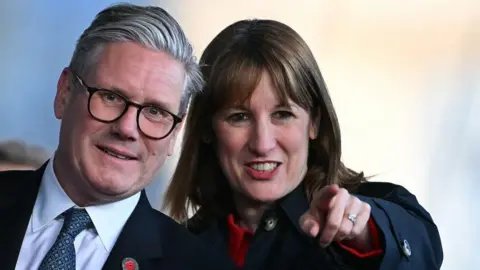Reeves and Starmer can't escape sluggish economy
 Getty Images
Getty ImagesWe are reminded rather starkly today of the backdrop – the all too hard to shift backdrop – that shapes our national life and conversation and the trade-offs the government confronts.
The latest GDP figures underline the baked in sluggishness, the flatlining, even the shrivelling of the economy.
All this after the prime minister and the chancellor sought to badge their Spending Review on Wednesday as the beginning of a new chapter.
Rachel Reeves hopes her prescription can be part of the cure for our collective economic woes, writing in The Daily Telegraph that "investment" is "with a singular purpose in mind – to make you and your family better off."
But that feels, just as it did under the previous government, like an aspiration for another day, some distance away, rather than an imminent prospect.
The economic sluggishness has another impact too. There is a widespread recognition, including in the Treasury, that the limits are being reached on what the government can sustainably borrow.
If there is an acceptance there can't be any more borrowing and the economy remains in the slow lane, that points to more tax rises in the Budget in the autumn.
Meanwhile, the chancellor has asked her MPs to go out and sell the government's plan - just as some of them grumble that both she and the prime minister are no good at doing that themselves.
There is a frustration from some at the apparent inability of Sir Keir Starmer and Rachel Reeves to talk in pictures, to punchily, directly and repeatedly articulate in a way that is absorbed what the government is about and who it is for.
Is the defining mission clear enough? Is this a government with a demeanour and posture that matches its majority?
No, is the private judgement of some on its own side, let alone their critics, and some in business.
We are witnessing, says Paul Johnson of the Institute for Fiscal Studies, "a decade of a growing state".
"Over the parliament as a whole total departmental spending is set to grow at 2.3% a year above economy-wide inflation. It is worth recalling that it grew at 3.6% a year over the 2019-24 parliament," Johnson adds – when the Conservatives were in charge.
And one final observation – just because of its scale. A growing part of that growing state is the health service.
By 2028-29 the day to day spending on the NHS for the year will be nearly a quarter of a trillion pounds.
£226bn is around the same as the total economic output of the Portuguese economy.
And still the question is asked by some about whether that is enough, as others ponder for how long numbers this big and rising can possibly be sustainable.

Sign up for our Politics Essential newsletter to keep up with the inner workings of Westminster and beyond.
